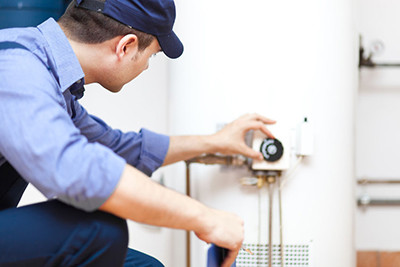Imagine coming home after a long, exhausting day of work to find a large puddle of water covering your floor. It’s not a great experience, but it happens all the time.
Signs you may need a new water heater
1. Hot Water Temperature Problems
If you’re noticing that your water heater is not providing adequate hot water, your first step is to adjust the thermostat on the water heater (if you have one) between 120 and 140 degrees. If you have a gas water heater you should be able to adjust the temperature settings on the water heater, there is a range from warmer to hotter. Try this first, if this doesn’t work call a professional plumber.
If there’s absolutely no hot water your thermocouple may need to be replaced instead of the entire unit. But it’s best to contact a licensed plumber to troubleshoot your water heater.
2. Loud Noises from Water Heater
If you’re noticing that your water heater is grumbling, clanking and making other loud noises this may be a sign that your water heater is going out. Loud noises are usually caused by hard water sediment being stirred up in the tank and coming in contact with the heating element. The sediment is literally burning up as it comes in contact with the heating element.
It could be that the heating element needs replacement or the entire unit needs to be replaced. This depends on the age of the water heater.
3. Water Heater Leaks (Tanks or Valves)
Any sign of a leak in your water heater requires a call to a plumber. A leak usually requires the entire unit to be replaced. If you see any water leaks from the unit or a puddle under or around the water heater call a licensed plumber right away. You want to avoid any flooding and damage to your home.
4. Age of Water Heater
If your water heater is over 10 years old and you start to have temperature problems or loud noises its probably time to replace the entire water heater. Don’t wait until it begins to leak, you’ll just have additional clean up and possibly property damage along with the cost of a new water heater.
5. Hot Water Metallic Smells and Tastes
If you turn on the hot water and it has a metallic odor or taste this means the inner part of the tank is breaking down and flaking off and mixing with your water supply. It’s time to replace.
6. Sandy Tap Water (Including Hot)
If you notice brown sandy water when you turn on the hot water this usually means that the hard water sediment is mixing in with your water supply. Sometimes this can be fixed with a water heater flush. However, if your water heater is over 10 years a replacement is likely necessary.
Maintaining, repairing or replacing a water heater unfortunately, is just part of being a homeowner. However, there are steps that can be taken in order to prevent such disasters. For example having your water heater tank flushed at least once a year will generally extend the life of your water heater and keep up the efficiency. On average, a standard water heater will last 8-13 years. During that time repairs and maintenance can cost anywhere from approximately $130 and up, depending on the severity of the problem. Water heaters contain few moving parts: pilot light, circuit breaker, burner, heating element, thermostat or gas valve. Depending on the age of the water heater it may be more cost effective to repair one of these parts as opposed to replacing the entire unit, but that should be based on the life expectancy, even with a new part.
A new standard unit including code upgrades enforced by the authority having jurisdiction may cost over $1500. The cost will depend on the following factors, the size of your water heater, features and it’s capabilities.
For example a tankless water heater proves to be very efficient, provides longer lasting hot water and includes a manufacturer warranty that surpasses that of a standard water heater. A tankless can cost up to four times the amount of a standard unit and probably the main reason most go for the standard. However, with a tankless you will get improved insulation and they are designed to lesson or help prevent corrosion inside the tank.
Make sure to get a professional opinion on what would be the best option to suit your home needs and budget.

